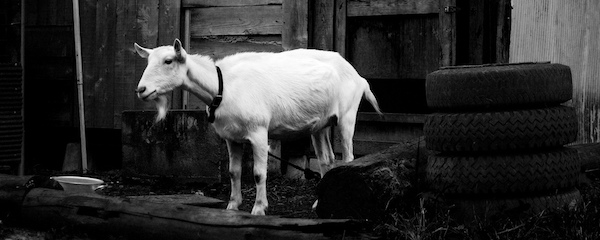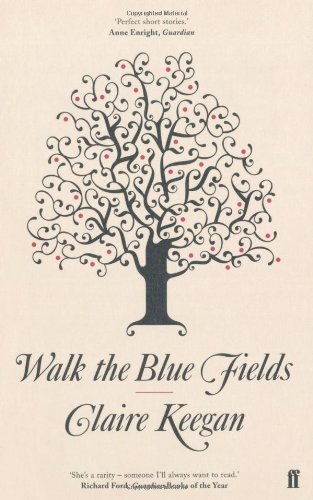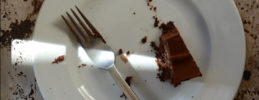
('Goat' © jimgris, 2007)
*
WITH VARYING DEGREES OF RELUCTANCE
by JUDITH GEORGE
*
A dead priest.
A woman, Margaret.
A man, Stack.
A goat, Josephine.
A power cut.
A wall.
A child.
A choice.
The plot is told. The weaving is thick. Here we will begin to unravel the mysterious shape given to Irish short story writer Claire Keegan’s pre-eminent story ‘Night of the Quicken Trees’, from her second collection, Walk the Blue Fields. It is a story that shifts in pain and poise to the protagonists’ deferred comings-of-age, and that stirringly enacts Irish folklore, broadening the significance of circumstance that make up their storied lives. There also exists a precision about how the tale is told. In a 2013 talk for the Howard County Poetry & Literature Society Keegan said: ‘All fine stories are told with varying degrees of reluctance. I think stories don’t want to be told. When things are painful we are very reluctant to speak of it.’ When one is reluctant to speak of a difficult matter, the words that do come out often come with an exact clarity, and it is this that is present in Keegan’s style.
 The death of the priest is the catalyst for Margaret’s move to County Clare, and to the house that once belonged to him – he was her first cousin and once a lover, in the summer when she was still a teenager:
The death of the priest is the catalyst for Margaret’s move to County Clare, and to the house that once belonged to him – he was her first cousin and once a lover, in the summer when she was still a teenager:
They lay down without a word on the wet grass and she knew while he was planting his seed in her that she would pay for it. Afterwards, he got up and paced between the trees and smoked a cigarette. Then he turned his back and went off without a word.
An illegitimate child was begotten, a son, all those many years ago, was born but died in his cot. ‘“It happens,” [the doctor said]. She would never forgive him for that.’ These early instances explore pain through silence, with the reader being left to examine what those silences might mean. Sean O’Hagan from The Observer has said of Keegan’s writing:
[It] deals in suggestion, exactitude and telling detail. [There is] a sense of confidence in the sparseness of the form that extends from the writer to the reader, allowing all that is not said to hold sway on the imagination.
This element of silence threads throughout ‘Night of the Quicken Trees’.
Margaret Flusk is strange in her ways. So is Stack, for that matter. And since they share their points of view in equal length for the duration of the story, it may be said they are parallel protagonists. This allows their opposing, though mutually inclusive, perspectives to build a greater picture of one another, often with humorous results.
When Margaret moves into the dead priest’s house, and Stack is living on the other side of the split house, initially no introductions are made, but they observe each other from a distance. Margaret is first described as a woman in her late thirties, ‘a bold spear of a woman [who] had neither hat nor rubber boots nor a man…’
Her brown hair was long, flowing in loose strands like seaweed down her back. She wore a big sheepskin coat that fitted her to perfection and when she looked out at the mortal world it was with the severity of a woman who has endured much and survived.
Stack, on the other hand, is a forty-nine-year-old bachelor who ‘had a bald head and seeds of grey in his eyes’, and, ‘like every man who has never known a woman, believed he knew a great deal about women’. But Josephine, for all intents and purposes, is Stack’s only love and joy in the beginning of the story:
…the sleek brown goat […] had the run of the house. By day she stared into the fire and at night she took up more than half of the bed. Stack milked her every day, rubbed Palmolive on her teats and always remembered to bring her fig rolls from the town.
On her first day in Dunagore, ‘when it got dark at five o’clock’, Margaret ‘went outside and lifted her skirt and squatted in the grass. She wanted to pass water on every blade of grass around her house, she could not say why’ – this is something which she continues to do. On the night before Christmas Eve, Margaret walks to the cliffs of Moher and back and then ‘placed her feet in a basin of soapy water’. The epigraph to the story explains that it is from a folktale that ‘feetwater’ must be thrown out before night’s end with a word of blessing being uttered, or else the house will be cursed. Falling asleep, dreaming and then awakening, still that same night, Margaret ‘saw the basin of feetwater […] opened the back door and threw it out on the wind. The wind was so loud it shouted like a man’. Stack’s take on this is that ‘Margaret Flusk is wild’.
Hadn’t he seen her bare breast under the fur [coat]? Sure didn’t she piss outside? Hadn’t she got up in her sleep knowing he was there and not so much as blinked when he cried out?’
After having the feetwater thrown upon him, Stack eventually decides to take a bath (which he hadn’t done since Halloween), and because he has a gas stove and fireplace, he invites Margaret to have breakfast: ‘he took an eel out of the fridge and put it on the pan to fry’ then went over to Margaret’s and introduced himself, even though she ‘wanted to stand there and stare him down but it was Christmas and, out of common decency, she opened the door’. Very little is said between them, but soon Margaret follows him into his house and is asked to pull up a chair:
She didn’t want to pull up a chair, didn’t want to sit in that awful place eating fried snake […] Well, what did she expect? What happens when a woman follows a man into his house wearing little more than her nightdress on Christmas morning?
Well, a great deal more than you’d think. Days and weeks go by until they confront one another again. Margaret goes in to Stack’s house and takes off her boots. He says, “You’ve a fine pair of feet […] God bless them”, and again silence holds sway: ‘She didn’t answer; she just kept the silence and sat looking at him.’ Then only a few words of dialogue bring them together:
“My eggs are right.”
“Your eggs?”
“Come to bed for an hour.”
The precision and reticence of Keegan’s writing brings to mind another Irish writer’s assertion about the process of writing. Colm Tóibín, in an interview for the Louisianna Channel, said ‘you have to constantly make decisions and excisions; working becomes a form of erasure as much as a form of addition’. So little in ‘Night of the Quicken Trees’ is said, and yet what is said speaks volumes. That is the key to Keegan’s unflinching style.
A child is begotten and the following morning, in few words once again, Stack agrees to have Margaret take down the wall between their houses with a sledgehammer. Since Stack doesn’t have one, Margaret drives into Ennistymon to buy it. On her way back, she considers:
For most of the time people crazy or sober were stumbling in the dark, reaching with outstretched hands for something they didn’t even know they wanted. She was expecting a child. She knew this the way she knew, after Christmas morning, that it was Stack, not the wind, on her doorstep; it was him shouted.
The corollary is that the two houses become one, and so do they, in a way:
Stack stood in his own house at the dividing wall and felt afraid. When that wall came down nothing again would ever be the same. He could feel the grief of Margaret Flusk. Her grief was beyond comparison […] He stood there and heard the plaster loosen, then the stones […] When she got through the hole in the wall, Stack was singing.
“They say Clare people are musical,” she said.
“They say Wicklow people suck goats’ milk from the teat.”
“That’s why we’re so good-looking.”
“You’re a quare woman.”
“Do you think the child will live?”
“I don’t know.”
“Do you know nothing?” she said.
“No.”
“Neither do I.”
“Aren’t we blessed?”
In wonderful juxtaposition to the opening of the story, Josephine does not like this new arrangement:
Stack didn’t seem to love her any more. He didn’t even warm his hands before he milked her and he forgot to rub Palmolive on her teats. The woman stole her milk, tied her to his bedpost, then told Stack she belonged in the shed.
The child, christened Michael with goat’s milk from Josephine, is born and lives. When a fisherman came after the first child’s death, asking for the caul (a superstition of good luck on voyages), Margaret couldn’t part with it, and he drowned. This time, when a fisherman comes over to buy the caul, ‘she would not take a penny […] and treated him like royalty’. Margaret home-schools Michael to the age of seven, but the villagers begin to descend on her, making her uncomfortable and fear for her way of life in Dunagore.
From the very beginning, Margaret makes a decision:
…she would stay in that house for as long as she could without harming anybody or letting anybody harm her. If either one of these things happened [she would] cross over to the Aran Islands.
And so it comes to pass that without a word to Stack, one morning, Margaret takes Michael to the boat with the intention of leaving for good. Stack, however, senses this and goes down to the boat as well. The choice becomes one for Stack to make. Still silent, he knows he could take one step into the boat and be off with Margaret and his son; on the other hand, he could simply let them go and return to Josephine. The decision is made in the story, but I will not tell it. Read on, and you will find out.
On a final note, I will leave the reader with Claire Keegan’s thoughts on silence and the art of reading:
There is only so much you say as a writer and then you must rely quite heavily on the reader and their own consciousness and their own mysteries and their private lives to explore the mystery of what is not said within the given story. It’s one of the glorious reasons why we read.
So, yes, read on, dear friends. Read on.
~
 Judith George is an enthusiast of the short story form, but seems to communicate best through essays and poetry. She won the Hart House Poetry Prize (University of Toronto) the last two years running. Armchair travel has been her latest bout of vacationing, with hopes to return to London where she studied for a year in 2001, and to Ireland which welcomed her in 2004.
Judith George is an enthusiast of the short story form, but seems to communicate best through essays and poetry. She won the Hart House Poetry Prize (University of Toronto) the last two years running. Armchair travel has been her latest bout of vacationing, with hopes to return to London where she studied for a year in 2001, and to Ireland which welcomed her in 2004.


